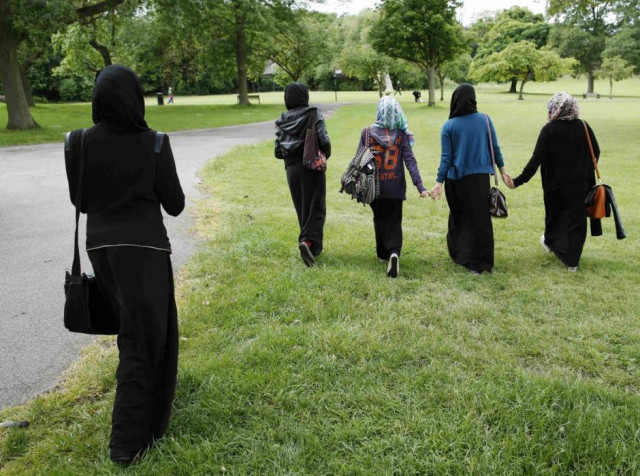Islamophobia holding back UK Muslims in workplace: study
Study shows one in five Muslim adults in full-time work compared with 35% of overall population

Muslim women walk in the park after finishing a GCSE exam near their school in Hackney, east London. PHOTO: REUTERS
The study for the UK government’s social mobility watchdog found strong work ethics and high resilience that translated into impressive educational front, however, only six per cent of Muslims were seen to enter the workplace compared to 10 per cent of the overall population in England and Wales.
The research further added that Muslims were less likely to be employed full-time with 19.8 per cent aged between 16 and 74 in full-time employment in contrast to 34.9 per cent of the overall population.
UK’s response to terror attacks risks ‘alienating’ Muslim community: report
But when it came to Muslim women and employment, one major factor was of emphasis on marriage and motherhood in communities rather than career. About 18 per cent of Muslim women aged 16 to 74 were logged as “looking after home and family” compared to 6 per cent of overall population. Those who opted for work, faced discrimination due to their headscarves.
Academics, on the other hand, listed a number of obstacles faced by Muslims, including stereotyping, bullying and harassment, low expectations from teachers, lack of Muslim staff and role models in the classroom. They also highlighted that people with ethnic-sounding names were less likely to be called for interviews. And when they were, Muslim workers often had to work “10 times as hard” to be seen the same as white people.
“Muslims are being excluded, discriminated against or failed at all stages of their transition from education to employment. Taken together, these contributory factors have profound implications for social mobility,” said Professor Jacqueline Stevenson, of Sheffield Hallam University, which led the research.
Speaking to the Guardian, Stevenson stressed routine examples of Muslims “failing to secure jobs that were commensurate with their skills and qualifications.”
The latest study intended to build on a previous report by the commission which found Pakistani and Bangladeshi origin children less likely to enter managerial or professional jobs despite outperforming other ethnic groups in education.
In an in-depth analysis of focus groups throughout Britain, young Muslims opened up about their experiences. A woman in Liverpool was suggested by her father to change her name to secure a job. Another in High Wycombe had to hear comments such as “he looked very Muslim” or “look at her, she’s got a scarf on”. One said all ethnic-minority children feared getting bullied in school.
Prevent duty stigmatising Muslim students in UK: study
A researcher for the study, Farhana Ghaffar said she was “incredibly shocked” by the results. Having grown up in London with her parents, she said she was always encouraged by teachers and supported throughout university.
The 25-year-old Muslim woman said “it ranged from assumptions that they were forced to wear the headscarf to jokes and casual comments in workplace about Muslims. Or every time there was a terror attack there was a feeling of a need to apologise and explain.”
Describing the barriers faced by Muslims within workplace, Ghaffar stressed that drinking alcohol was a culture Muslims were unable to indulge in. But Alan Milbunr, a former cabinet minister who now heads the government-sponsored Social Mobility Commission, insists that the study “painted a disturbing picture.” “The British social mobility promise is that hard work will be rewarded. Unfortunately, for many young Muslims in Britain today this promise is being broken,” he said.
“Young Muslims themselves identify cultural barriers in their communities and discrimination in the education system and labour market as some of the principal obstacles that stand in their way. Young Muslim women face a specific challenge to maintain their identity while seeking to succeed in modern Britain,” he stressed.
This article originally appeared on The Guardian.



















COMMENTS
Comments are moderated and generally will be posted if they are on-topic and not abusive.
For more information, please see our Comments FAQ